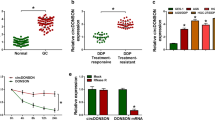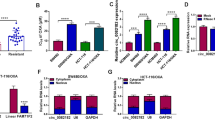Abstract
Cisplatin (DDP) is used for the clinical management of triple-negative breast cancer (TNBC). However, the development of drug resistance limits its therapeutic efficacy. Circular RNAs (circRNAs) are known to be involved in tumor DDP resistance. In our previous study, we reported that circ_0007823 expression is downregulated and correlated with adverse prognosis in TNBC. However, its association with DDP resistance remains unclear. This study aimed to determine the role of circ_0007823 and miR-182-5p in DDP-resistant TNBC and explore the underlying mechanisms. First, expression profiles circ_0007823, microRNA (miR)-182-5p, and forkhead box O1 (FOXO1) in TNBC cells were determined. Additionally, biological characteristics of cells, including apoptosis, cell cycle, proliferation, and migration, were analyzed using various assays. Luciferase reporter and rescue assays were used to determine the correlations among circ_0007823, miR-182-5p, and FOXO1 expression. MiR-182-5p was overexpressed in DDP-resistant TNBC cells. MiR-182-5p knockdown suppressed the invasiveness and increased the apoptosis of drug-resistant cells, contributing to G1 arrest and S phase reduction. Mechanistically, circ_0007823 targeted miR-182-5p, and its overexpression drastically reduced the promotional effects of the miR-182-5p mimic on the aggression and transfer ability of drug-resistant cells. Furthermore, FOXO1 overexpression increased the sensitivity of cells to DDP and reduced their malignant progression. Therefore, FOXO1 was established as the downstream target of miR-182-5p that may be used to treat DDP-resistant TNBC. In summary, circ_0007823 overexpression attenuated DDP resistance in TNBC via the miR-182-5p–FOXO1 axis, indicating the therapeutic potential of circ_0007823 DDP-resistant TNBC treatment.



Similar content being viewed by others
Data Availability
The datasets generated during and/or analysed during the current study are available from the corresponding author on reasonable request.
References
Ali Salman RJC, Molecular, Reports B (2023) Prevalence of women breast cancer. 3(4):185–196. https://doi.org/10.55705/cmbr.2023.384467.1095
Anilkumar KV et al (2023) miRNAs in the prognosis of triple-negative breast cancer: a review. Life Sci 333:122183
Cao M-Q et al (2018) Mir-182-5p promotes hepatocellular carcinoma progression by repressing FOXO3a. J Hematol Oncol 11(1):12
Chen J et al (2022) CircRNA_0044556 diminishes the sensitivity of triple–negative breast cancer cells to adriamycin by sponging miR–145 and regulating NRAS. Mol Med Rep 25(2):1–12
Coffetti G et al (2023) The challenging treatment of cisplatin-resistant tumors: state of the art and future perspectives. Molecules 28(8):3407
Deng S et al (2023) Circular RNA ARHGAP5 inhibits cisplatin resistance in cervical squamous cell carcinoma by interacting with AUF1. Cancer Sci 114(4):1582–1595
Garrido-Castro AC et al (2019) Insights into molecular classifications of Triple-negative breast Cancer: improving patient selection for treatment. Cancer Discov 9(2):176–198
Ghosh SJBc (2019) Cisplatin: the first metal based anticancer drug.88:102925. https://www.sciencedirect.com/science/article/abs/pii/S0045206818311969
He Z, Zhu Q (2023) Circular RNAs: emerging roles and new insights in human cancers. Biomed Pharmacother 165:115217
Kalra M et al (2021) Cisplatin +/- rucaparib after preoperative chemotherapy in patients with triple-negative or BRCA mutated breast cancer. NPJ Breast Cancer 7(1):29
Kono M et al (2017) Androgen receptor function and androgen receptor-targeted therapies in breast Cancer. Rev JAMA Oncol 3(9):1266–1273
Kristensen LS et al (2022) The emerging roles of circRNAs in cancer and oncology. Nat Rev Clin Oncol 19(3):188–206
Kumar P, Aggarwal R (2016) An overview of triple-negative breast cancer. Arch Gynecol Obstet 293(2):247–269
Lev S (2020) Targeted therapy and drug resistance in triple-negative breast cancer: the EGFR axis. Biochem Soc Trans 48(2):657–665
Li S et al (2019) Targeted inhibition of miR-221/222 promotes cell sensitivity to cisplatin in triple-negative breast cancer MDA-MB-231 cells. Front Genet 10:1278
Li Y et al (2022) Recent advances in therapeutic strategies for triple-negative breast cancer. J Hematol Oncol 15(1):121
Lin M-Y et al (2021) OncomiR mir-182-5p enhances radiosensitivity by inhibiting the radiation-induced antioxidant effect through SESN2 in head and neck cancer. Antioxidants (Basel, Switzerland) 10(11):1808
Luo S et al (2023) CircUSP42 ameliorates LPS-induced human renal epithelial cells in vitro by regulating the miR-182-5p/DUSP1 axis. 10.1097. Shock 10:1097
Ma X et al (2022) Cinobufagin inhibits tumor progression and reduces doxorubicin resistance by enhancing FOXO1-mediated transcription of FCGBP in osteosarcoma. J Ethnopharmacol 296:115433
Mu Q et al (2021) Research progress on the functions and mechanism of circRNA in cisplatin resistance in tumors. Front Pharmacol 12:709324
Sang Y et al (2019) circRNA_0025202 regulates tamoxifen sensitivity and tumor progression via regulating the miR-182-5p/FOXO3a axis in breast cancer. Mol TherJ Am Soc Gene Ther 27(9):1638–1652
Seidl C et al (2020) MicroRNA-182-5p regulates hedgehog signaling pathway and chemosensitivity of cisplatin-resistant lung adenocarcinoma cells via targeting GLI2. Cancer Lett 469:266–276
Sun C-Y et al (2019) Phytochemicals: Current strategy to sensitize cancer cells to cisplatin. Biomed Pharmacother 110:518–527
Sun T et al (2020) FOXO1 and FOXO3a sensitize non-small-cell lung cancer cells to cisplatin-induced apoptosis. Indep Bim 52(12):1348–1359
Wang Y et al (2021) Paeoniflorin sensitizes breast cancer cells to tamoxifen by downregulating microRNA-15b via the FOXO1/CCND1/β-catenin axis. Drug Design Develop Ther 15:245–257
Wang L et al (2022a) Circular RNA UBAP2 facilitates the cisplatin resistance of triple-negative breast cancer via microRNA-300/anti-silencing function 1B histone chaperone/PI3K/AKT/mTOR axis. Bioengineered 13(3):7197–7208
Wang Z et al (2022b) Circ-TRIO promotes TNBC progression by regulating the miR-432-5p/CCDC58 axis. Cell Death Dis 13(9):776
Wu L et al (2022) CircRNA circ_0005273 contributes to the cisplatin resistance of cervical cancer cells by sponging miR-133b. J Obstet Gynaecol J Inst Obstet Gynecol 42(7):3086–3093
Yan H, Bu P (2021) Non-coding RNA in cancer. Essays Biochem 65(4):625–639
Yu J et al. (2020a) Hsa_circ_USP42 inhibits metastasis in triple negative breast cancer through competitive binding miR-182-5. 41(02):205–210. https://doi.org/10.16118/j.1008-0392.2020.02.011
Yu J et al (2020b) circUSP42 is downregulated in triple-negative breast cancer and associated with poor prognosis. Technol Cancer Res Treat 19:1533033820950827
Funding
This study was supported by Shanghai Municipal Health Commission (No. 202040144) and Changning Maternity and Infant Health Hospital (No. 2021Y-16). The authors declare that no funds, grants, or other support were received during the preparation of this manuscript.
Author information
Authors and Affiliations
Contributions
All authors contributed to the study conception and design. HW, XW, WS, YZ, JC, HL, JY: Material preparation, data collection and analysis were performed. HW, XW: The first draft of the manuscript was written. HW, JY: Funding was obtained. All authors commented on previous versions of the manuscript. All authors read and approved the final manuscript.
Corresponding author
Ethics declarations
Competing interest
The authors declare no competing interests.
Ethical Approval
This study did not require ethics approval since no human or animals involved.
Consent to Participate
Not applicable.
Consent to Publish
Not applicable.
Additional information
Publisher’s Note
Springer Nature remains neutral with regard to jurisdictional claims in published maps and institutional affiliations.
Rights and permissions
Springer Nature or its licensor (e.g. a society or other partner) holds exclusive rights to this article under a publishing agreement with the author(s) or other rightsholder(s); author self-archiving of the accepted manuscript version of this article is solely governed by the terms of such publishing agreement and applicable law.
About this article
Cite this article
Wang, H., Wang, X., Shen, W. et al. CircRNA (circ)_0007823 Contributes to Triple-Negative Breast Cancer Progression and Cisplatin Resistance via the miR-182-5p/FOXO1 Pathway. Biochem Genet (2024). https://doi.org/10.1007/s10528-024-10783-9
Received:
Accepted:
Published:
DOI: https://doi.org/10.1007/s10528-024-10783-9




